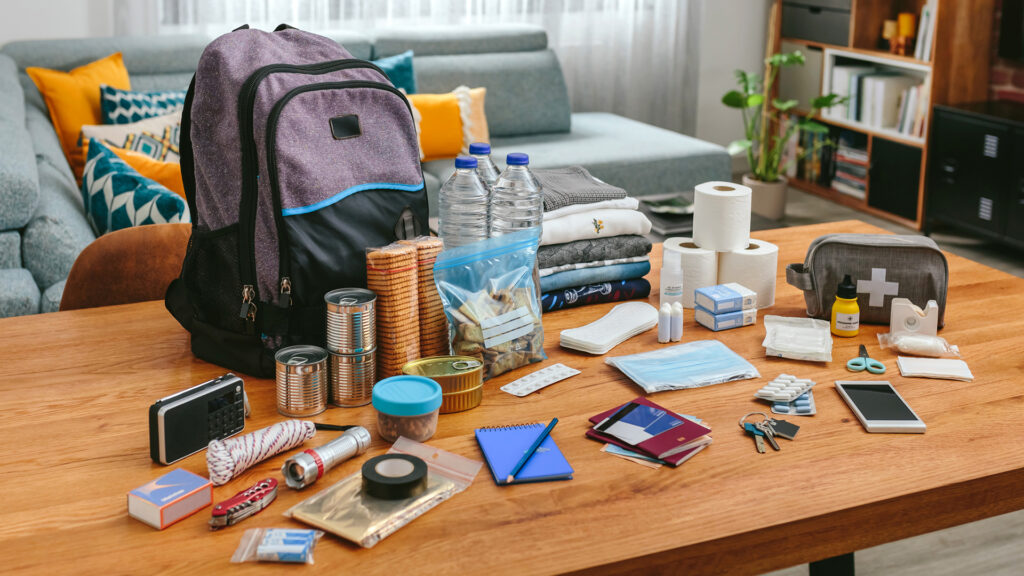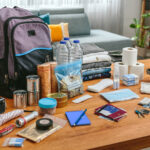Have you had one of those moments where you feel like you’ve prepared everything you need for a hike, a day out, or a child’s field trip, and suddenly, you realize you forgot something essential? It’s usually not as big a deal if you forget their favorite snack if you have other food, but what if you forgot something essential, like allergy support or their water bottle?
That’s how emergency preparedness often goes regarding medicines and supplements – an easily overlooked category of preparing for emergencies that many forget. While food, PPE, and energy sources are crucial, you don’t want to get three hours, let alone three days, into an emergency and realize you don’t have a proper first aid kit or a backup supply of the supplements you rely on most to stay healthy.
Read below for a checklist to ensure you have everything you need in your emergency preparedness toolkit regarding medicine and supplements!
COVER ALL BASES
With emergency preparedness, you want to be ready for anything, so I recommend prepping two kinds of health kits: an allopathic medicine kit and an herbal and natural kit.
Allopathic (a term used to describe mainstream medicine) kits are what we’re used to seeing in the Western world, with band-aids, cue tips, wound tape, tweezers, gauze, alcohol wipes, antiseptic ointment or spray, burn treatment products, and more. These kits are helpful to ensure you have the tools you need to care for cuts, scrapes, minor burns, and other minor injuries. You can purchase these ready-made or create your own (here is a decent starter list of standard items to include).
I also recommend having a natural and herbal medicine kit on hand. Finding this ready-made is not likely, so you’ll want to assemble your own.
A few items I would recommend to include in your natural and herbal medicine kit are:
- Cayenne powder or turmeric powder to help stop bleeding in the event of a nasty cut
- Ginger capsules for upset stomachs or mild food poisoning symptoms
- Hydrogen peroxide is a helpful all-purpose cleaner, including for minor cuts and abrasions
- Coconut oil helps soothe irritated, itchy, or dry skin and is a natural antiseptic
- The ABCs of homeopathic remedies: A for Arnica, an excellent pain reliever; B for Belladonna, for fevers, headaches, and nervous conditions; and C for Chamomilla, to help calm an agitated system. These are particularly helpful for newborns, infants, and young children.
NEXT-LEVEL NATURAL EMERGENCY PREPAREDNESS
In addition to both of the kits listed above, I’d recommend stocking up on the following helpful natural home remedies to be sure you’ve always got solutions on hand for various situations.
Basic Essential Oils
- Lavender for its calming and sleep-support benefits and as a topical skin remedy
- Clove for its pain-relief properties, especially for teeth
- Sage as a mold-fighter
- Rosemary is a mold and overall airborne pathogen fighter
- Thyme as an air cleaner and mold-fighter
- Lemon for use as an all-purpose cleaner when diluted in water
Dried Herbs
(seal these healing herbs in airtight packages and storge in a cool, dry place)
- Nettle
- Red clover
- Peppermint
- Red raspberry
- Dandelion
- Burdock
- Sage
- Rosemary
- Oregano
MEDICINES AND SUPPLEMENTS
Keep your emergency preparedness kit well-stocked with essential home medicines like a good, clean pain relief tablet from Genexa and a good ibuprofen option, just in case. Speak with your prescribing physician about maintaining a backup supply of essential medications, and follow instructions for proper storage.
For supplements, I recommend having at least two extra bottles of the Core 7 supplements (vitamin B12, zinc, micro C, lemon balm, cat’s claw, l-lysine, and licorice root), plus goldenseal, curcumin, and olive leaf.
These core supplements give you everything you need to strengthen your immune and nervous systems in emergencies.
Stocking up on most of the supplements offered by Vimergy (if you’re able) will set you up for even greater success in navigating a temporary shutdown in society due to extraordinary circumstances.
KEEP CALM AND PLAN AHEAD
As is always the case, you don’t want to do emergency planning when panicking. Give thought to all of your possible needs in an emergency now so that if, two months from now, we all need to stay indoors for a week or two, you will have peace of mind for yourself and your family.
To help you stay on top of ALL of your emergency preparedness, visit my other blogs in this series!
More coming soon!
To your health and peace,
Muneeza





